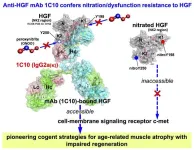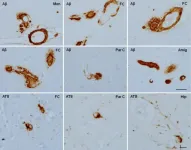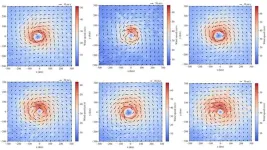(Press-News.org) Research Highlights:
The oral medication muvalaplin may safely lower high levels of lipoprotein(a), also known as Lp(a), an independent, inherited risk factor for cardiovascular disease.
Muvalaplin is a small molecule inhibitor that prevents the bonding of the two protein components that combine to make Lp(a). There are no currently FDA-approved medications to lower Lp(a) levels, though other medications are currently being evaluated in clinical trials. Muvalaplin is the first oral medication developed to lower Lp(a) levels.
Results from the KRAKEN clinical trial find that muvalaplin was well-tolerated and decreased Lp(a) levels within 24 hours of the first dose, with the majority of the effect seen by 4 weeks and persisting through the study, the researchers noted.
Note: The study featured in this news release is a research abstract. Abstracts presented at American Heart Association’s scientific meetings are not peer-reviewed, and the findings are considered preliminary until published as full manuscripts in a peer-reviewed scientific journal.
Embargoed until 1:52 p.m. CT/2:52 p.m. ET, Monday, Nov. 18, 2024
This news release contains updated information from the researcher that was not in the abstract.
CHICAGO, Nov. 18, 2024 — A clinical trial testing muvalaplin, a novel oral medication, was able to safely and effectively lower high levels of lipoprotein (a), according to late-breaking science presented today at the American Heart Association’s Scientific Sessions 2024. The meeting, Nov. 16-18, 2024, in Chicago, is a premier global exchange of the latest scientific advancements, research and evidence-based clinical practice updates in cardiovascular science. The study is simultaneously published today in JAMA, the Journal of the American Medical Association.
Lipoprotein(a), or Lp(a), is a type of inherited cholesterol level that is a common, independent risk factor for cardiovascular disease, affecting about 1 in 5 people worldwide. Black individuals of African descent and South Asian populations often have the highest Lp(a) levels, according to the American Heart Association’s 2021 scientific statement “Lipoprotein(a): A Genetically Determined, Causal, and Prevalent Risk Factor for Atherosclerotic Cardiovascular Disease.” It is different from low-density lipoprotein (LDL), or “bad” cholesterol. Lp(a) numbers of 50 mg/dL (125 nmol/L) or higher promote clotting and inflammation, significantly increasing the risk of heart attack, stroke, aortic stenosis and peripheral artery disease, especially for people who also have cardiovascular disease or familial hypercholesterolemia.
There are several injectable medications undergoing clinical evaluation as treatments to lower Lp(a) levels. However, none have yet been approved by the U.S. Food and Drug Administration.
“Most medications being developed to lower Lp(a) are injectable. Muvalaplin is the first oral agent being developed to lower Lp(a) levels and acts by disrupting formation of the Lp(a) particle,” said study author Stephen Nicholls, MBBS, Ph.D., director of the Victorian Heart Institute at Monash University in Melbourne, Australia.
The KRAKEN clinical trial included 233 adults around the world who were identified at high risk of having a cardiovascular event due to very high Lp(a) levels (greater than 175 nmol/L). Researchers evaluated the effects of muvalaplin at different doses—10 mg, 60 mg or 240 mg, taken daily—compared with a daily placebo for 12 weeks. The researchers tested Lp(a) levels using both the traditional Lp(a) blood test and a new test that more specifically measures the levels of intact Lp(a) particles in the blood.
At week 12, the study found:
Compared to placebo, muvalaplin treatment reduced Lp(a) by up to 70% as measured by the traditional blood test, and by up to 85.5% as measured by the new intact Lp(a) particle test. Participants who received either 60 or 240 mg of muvalaplin had similar reductions in Lp(a) levels, both of which were greater than the reductions in Lp(a) levels of participants who received 10 mg of muvalaplin.
Muvalaplin treatment resulted in approximately 97% of participants achieving Lp(a) lower than 125 nmol/L, as measured by the intact Lp(a) particle test, or approximately 82% of participants as measured with the traditional blood test.
Compared to placebo, muvalaplin lowered apoB, one of two major proteins that make up Lp(a), by as much as 16%, with no notable change in levels of high-sensitivity C-reactive Protein (hsCRP), which is a way to measure heart attack and stroke risk.
“We were encouraged by the degree of Lp(a)-lowering in these patients who are most likely to benefit from its use and by the safety and tolerability,” Nicholls said. “While muvalaplin appears to be an effective approach to lowering Lp(a) levels, we still need to study whether Lp(a) lowering will result in fewer heart attacks and strokes.”
The study had limitations, including that it was relatively small and trial participants were treated for only 12 weeks. “Larger, more diverse and longer-term studies are needed,” Nicholls noted.
Study details, background and design:
The study included 233 adults with high Lp(a) levels, defined as greater than 175 nmol/L, and either atherosclerotic cardiovascular disease, Type 2 diabetes or familial hypercholesterolemia. 33% of participants were women and 67% were men. 66% self-identified as white adults; 27% as Asian adults; 4% as Black adults; and 3% identified as adults of “other” race.
The KRAKEN phase II clinical trial was conducted at 43 sites in Asia, Europe, Australia, Brazil and the U.S., from December 2022 to June 2024.
Participants had clinical visits at study enrollment (baseline) and weeks 1, 2, 4, 8 and 12 during the treatment period. The clinic visits consisted of blood tests for Lp(a) analysis, measurement of a standard lipid profile, and recording of safety and tolerability.
Co-authors and disclosures are listed in the manuscript. The trial was funded by Eli Lilly and Company.
Statements and conclusions of studies that are presented at the American Heart Association’s scientific meetings are solely those of the study authors and do not necessarily reflect the Association’s policy or position. The Association makes no representation or guarantee as to their accuracy or reliability. Abstracts presented at the Association’s scientific meetings are not peer-reviewed, rather, they are curated by independent review panels and are considered based on the potential to add to the diversity of scientific issues and views discussed at the meeting. The findings are considered preliminary until published as a full manuscript in a peer-reviewed scientific journal.
The Association receives funding primarily from individuals; foundations and corporations (including pharmaceutical, device manufacturers and other companies) also make donations and fund specific Association programs and events. The Association has strict policies to prevent these relationships from influencing the science content. Revenues from pharmaceutical and biotech companies, device manufacturers and health insurance providers and the Association’s overall financial information are available here.
Additional Resources:
Multimedia is available on the right column of the release link.
Link to abstract; and AHA Scientific Sessions 2024 Online Program Planner
AHA news release: One dose of experimental therapy reduced lipoprotein(a) more than 94% for nearly a year (Nov. 2023)
AHA news release: New research project aims to set standardized approach to lipoprotein(a) management (March 2023)
AHA health information: Lipoprotein (a) Meaning and How Does it Impact My Heart Health?
For more news at AHA Scientific Sessions 2024, follow us on X @HeartNews,#AHA24
###
About the American Heart Association
The American Heart Association is a relentless force for a world of longer, healthier lives. We are dedicated to ensuring equitable health in all communities. Through collaboration with numerous organizations, and powered by millions of volunteers, we fund innovative research, advocate for the public’s health and share lifesaving resources. The Dallas-based organization has been a leading source of health information for a century. During 2024 - our Centennial year - we celebrate our rich 100-year history and accomplishments. As we forge ahead into our second century of bold discovery and impact, our vision is to advance health and hope for everyone, everywhere. Connect with us on heart.org, Facebook, X or by calling 1-800-AHA-USA1.
END
In a small international trial, novel oral medication muvalaplin lowered Lp(a)
American Heart Association Scientific Sessions 2024, Abstract 4171286
2024-11-19
ELSE PRESS RELEASES FROM THIS DATE:
Eradivir’s EV25 therapeutic proven to reduce advanced-stage influenza viral loads faster, more thoroughly in preclinical studies than current therapies
2024-11-19
WEST LAFAYETTE, Ind. — Eradivir, a preclinical biotech company, has developed a patent-pending antiviral therapeutic that reduces lung viral loads of advanced-stage influenza in preclinical studies quicker and more effectively than currently available therapies.
A single intranasal dose of EV25, a bispecific small molecule developed by Eradivir, acts faster than the current standard of care, eliminating the detectable virus within 24 hours. EV25 also has a window of efficacy of 96 hours postinfection, which is broader than the current standard of care.
A ...
Most Medicare beneficiaries do not compare prescription drug plans – and may be sticking with bad plans
2024-11-19
Every fall, millions of Medicare beneficiaries have the chance to pick a new stand-alone prescription drug plan that may be better suited for them, but most stick with the same plan.
A new study published today in Health Affairs Scholar suggests that 52% of Medicare beneficiaries with stand-alone Part D plans did not switch because they made no plan comparisons at all for 2024. Many of these beneficiaries (41%) also reported not knowing how to switch plans.
“Comparing these Medicare Part D plans is hard, so many beneficiaries just don’t do it. But beneficiaries who don’t compare plans may not notice if they are sticking with more expensive plans or ...
“What Would They Say?” video wins second place in international award for tobacco control advocacy
2024-11-19
DALLAS, Nov. 19, 2024 —“What Would They Say?” – the powerful spoken word poem produced on video by the American Heart Association, which is celebrating 100 years of lifesaving service as the world’s leading voluntary organization focused on heart and brain health, has taken second place in the 4th Annual Anthem Awards winning the Silver Award in the Education, Art & Culture Campaign - Non-Profit Community Engagement category. This international recognition celebrates the Association’s impactful work and historic commitment ...
Black Britons from top backgrounds up to three times more likely to be downwardly mobile
2024-11-19
Even when their parents are lawyers, doctors, or executives, Black Britons are substantially more likely to end up in working class jobs than their White peers, a new study from the University of Kent reveals.
Funded by the Leverhulme Trust, this research shows that Black men from the most advantaged families are three times more likely than White men from similar backgrounds to be in working class jobs beyond age 30. Black women are also twice as likely as White women to experience this kind of downward mobility. This is true even after removing ...
Developing an antibody to combat age-related muscle atrophy
2024-11-19
Fukuoka, Japan—We all age. And while humanity’s life expectancy has increased dramatically in the modern era, we still struggle with the inevitable health issues our bodies face as we get up in the years. For example, the decrease of muscle mass and function, leading to weakness and atrophy. This is a pressing concern in a super-aging society like Japan where—while people live longer—without proper muscle strength, quality of life can be drastically diminished.
In findings that may eventually lead to targeted ...
Brain aging and Alzheimer's: Insights from non-human primates
2024-11-19
“Brain aging is a biological process that comprehends degenerative, adaptive, and regenerative brain changes that elapse through maturity until the elderly.”
BUFFALO, NY- November 19, 2024 – A new review was published in Aging (listed by MEDLINE/PubMed as "Aging (Albany NY)" and "Aging-US" by Web of Science), on October 29, 2024, Volume 16, Issue 20, titled, ”Brain aging and Alzheimer’s disease, a perspective from non-human primates.“
In the review, Ferrer Isidro from the University of Barcelona and Reial Acadèmia de Medicina de Catalunya, explores the differences in ...
Can cells ‘learn’ like brains?
2024-11-19
Individual cells appear capable of learning, a behaviour once deemed exclusive to animals with brains and complex nervous systems, according to the findings of a new study led by researchers at the Centre for Genomic Regulation (CRG) in Barcelona and Harvard Medical School in Boston.
The findings, published today in the journal Current Biology, could represent an important shift in how we view the fundamental units of life.
“Rather than following pre-programmed genetic instructions, cells are elevated to entities equipped ...
How cells get used to the familiar
2024-11-19
A dog learns to sit on command, a person hears and eventually tunes out the hum of a washing machine while reading … The capacity to learn and adapt is central to evolution and, indeed, survival.
Habituation — adaptation’s less-glamorous sibling — involves the lessening response to a stimulus after repeated exposure. Think the need for a third espresso to maintain the same level of concentration you once achieved with a single shot.
Up until recently, habituation — a simple form of learning — was deemed ...
Seemingly “broken” genes in coronaviruses may be essential for viral survival
2024-11-19
Viruses are lean, mean, infection machines. Their genomes are tiny, usually limited to a handful of absolutely essential genes, and they shed extra genomic deadweight extremely fast.
Usually.
Coronaviruses, including SARS-CoV-2 (the virus that causes COVID-19), appear at first glance to be an exception. They have some extra “accessory” genes in addition to the usual minimal viral set, and scientists don’t know what most of them do. Scientists believe these extra genes must be doing something important, though, or they would be rapidly lost as the viruses evolved.
Now, University of Utah Health researchers have found that some of these viral genes have stuck around ...
Improving hurricane modeling with physics-informed machine learning
2024-11-19
WASHINGTON, Nov. 19, 2024 – Hurricanes, or tropical cyclones, can be devastating natural disasters, leveling entire cities and claiming hundreds or thousands of lives. A key aspect of their destructive potential is their unpredictability. Hurricanes are complex weather phenomena, and how strong one will be or where it will make landfall is difficult to estimate.
In a paper published this week in Physics of Fluids, by AIP Publishing, a pair of researchers from the City University of Hong Kong employed machine learning to more accurately model the boundary layer wind field of tropical cyclones.
In atmospheric science, the boundary layer ...
LAST 30 PRESS RELEASES:
University of Miami business technology department ranked No. 1 in the nation for research productivity
Researchers build ultra-efficient optical sensors shrinking light to a chip
Why laws named after tragedies win public support
Missing geomagnetic reversals in the geomagnetic reversal history
EPA criminal sanctions align with a county’s wealth, not pollution
“Instead of humans, robots”: fully automated catalyst testing technology developed
Lehigh and Rice universities partner with global industry leaders to revolutionize catastrophe modeling
Engineers sharpen gene-editing tools to target cystic fibrosis
Pets can help older adults’ health & well-being, but may strain budgets too
First evidence of WHO ‘critical priority’ fungal pathogen becoming more deadly when co-infected with tuberculosis
World-first safety guide for public use of AI health chatbots
Women may face heart attack risk with a lower plaque level than men
Proximity to nuclear power plants associated with increased cancer mortality
Women’s risk of major cardiac events emerges at lower coronary plaque burden compared to men
Peatland lakes in the Congo Basin release carbon that is thousands of years old
Breadcrumbs lead to fossil free production of everyday goods
New computation method for climate extremes: Researchers at the University of Graz reveal tenfold increase of heat over Europe
Does mental health affect mortality risk in adults with cancer?
EANM launches new award to accelerate alpha radioligand therapy research
Globe-trotting ancient ‘sea-salamander’ fossils rediscovered from Australia’s dawn of the Age of Dinosaurs
Roadmap for Europe’s biodiversity monitoring system
Novel camel antimicrobial peptides show promise against drug-resistant bacteria
Scientists discover why we know when to stop scratching an itch
A hidden reason inner ear cells die – and what it means for preventing hearing loss
Researchers discover how tuberculosis bacteria use a “stealth” mechanism to evade the immune system
New microscopy technique lets scientists see cells in unprecedented detail and color
Sometimes less is more: Scientists rethink how to pack medicine into tiny delivery capsules
Scientists build low-cost microscope to study living cells in zero gravity
The Biophysical Journal names Denis V. Titov the 2025 Paper of the Year-Early Career Investigator awardee
Scientists show how your body senses cold—and why menthol feels cool
[Press-News.org] In a small international trial, novel oral medication muvalaplin lowered Lp(a)American Heart Association Scientific Sessions 2024, Abstract 4171286





